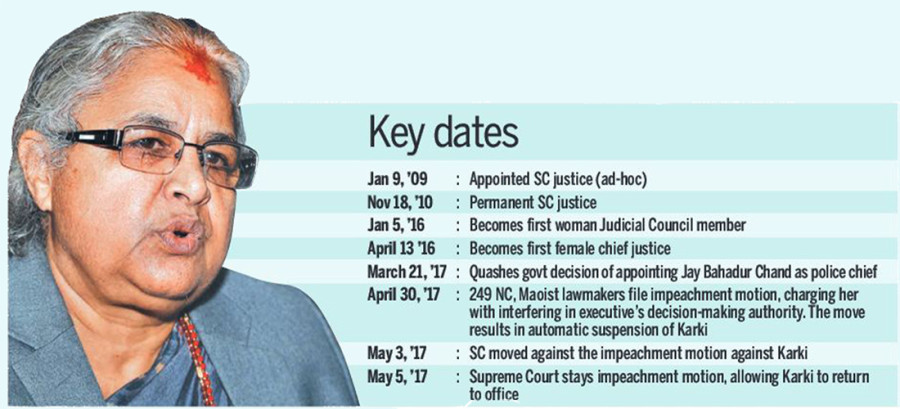National
SC stays impeachment motion against Karki
The Supreme Court (SC) on Friday issued an interim order against an impeachment motion against Chief Justice Sushila Karki and directed the Legislature-Parliament to put the motion on hold, allowing the first female head of the judiciary to return to the bench.
Binod Ghimire
The Supreme Court (SC) on Friday issued an interim order against an impeachment motion against Chief Justice Sushila Karki and directed the Legislature-Parliament to put the motion on hold, allowing the first female head of the judiciary to return to the bench.
With the precedent-setting apex court order, the ruling Nepali Congress-Maoist Centre alliance, which had drawn flak from several quarters for its move to impeach the chief justice, has come under immense pressure.
Karki, who stood suspended following the registration of the impeachment motion as per the constitutional provision, returned to the court on Friday itself. She, however, is set to resume work from Sunday.
Responding to a writ petition filed by advocates Sunil Ranjan Singh and Kanchan Krishna Neupane, a single bench of Justice Cholendra Shumsher Rana stayed the impeachment motion, saying “the move to impeach the chief justice is against the spirit of the Constitution of Nepal”.
It appears that the impeachment motion was brought in relation to an apex court order on the appointment of chief of Nepal Police, which is sub judice in this court, but the move, prima facie, is against the spirit of the constitution, the bench observed. “Hence, as per Rule 41 (1) of the Supreme Court Regulations, the court orders the defendants to put the impeachment motion on hold until a final decision on this petition that seeks to stay the issue,” the bench added.
As many as 249 lawmakers from the NC and Maoist Centre on Sunday had registered the impeachment motion against Karki, charging her with interfering in the executive’s jurisdiction. Of the nine charges they had levelled against Karki, one was related to a March 21 ruling, in which the apex court had quashed a February 12 government decision of appointing Jay Bahadur Chand as the chief of Nepal Police.
The ruling coalition’s move to impeach Karki had met with severe criticism from several quarters, with many accusing it of attacking the independence of the judiciary.
“The order is very much balanced as the move to impeach the chief justice was in clear violation of the rules that bar discussions on a sub judice case,” Bipin Adhikari, a constitution expert, told the Post. “This shows the move of NC and Maoist lawmakers was unconstitutional; they must apologise for their act.”
Adhikari also dismissed charges, levelled by some sections, that the apex court was involved in “judicial activism”, saying “working in the spirit of the constitution cannot be termed activism”.
Unlike other court rulings, which in general are full of legalese, Friday’s order by Justice Rana, however, is mixed with a tinge of emotion. “My heart is heavy and restless as I issue this interim order,” it reads. “I have felt and seen the morale of justices of this institution going down since the day the impeachment motion was registered,” the text of Rana’s ruling reads.
Interestingly, Justice Rana, who ruled against the motion that sought to impeach Karki, had once come under Karki’s radar back in 2012.
While convicting then sitting minister Jaya Prakash Gupta of corruption in 2012, a bench comprising Justices Karki and Tarkraj Bhatta had overturned a 2007 decision taken by a Special Court bench of judges comprising Rana, in which Gupta was acquitted.
The Karki-Bhatta bench had observed that the Special Court bench had passed a wrong judgment ignoring the evidence in relation to corruption charges against Gupta. The apex court had also decided to investigate the judges involved in taking the decision that acquitted Gupta.




 22.12°C Kathmandu
22.12°C Kathmandu














